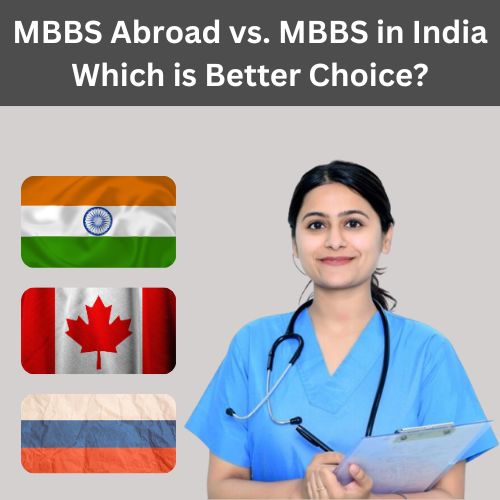Pursuing a career in medicine is a prestigious and rewarding journey. For many Indian students, choosing between studying MBBS abroad and studying MBBS in India is a pivotal decision.
This choice depends on several factors, including budget, quality of education, available seats, and long-term career goals.
In recent years, MBBS abroad for Indian students has gained popularity as an option that provides a high-quality education, sometimes at lower costs and without the intense competition seen in India.
If you’re considering options for medical education, here’s a comparison of MBBS abroad and MBBS in India to help make an informed choice.

Admission Requirements and Competition
MBBS in India:
In India, securing a seat in an MBBS program is highly competitive. The NEET (National Eligibility cum Entrance Test) is required, and the limited seats in government colleges lead to fierce competition, with many students failing to secure a place despite scoring high.
Private medical colleges in India offer seats but at a high cost, which isn’t feasible for everyone.
MBBS Abroad for Indian Students:
One of the biggest attractions of studying MBBS abroad is the relatively easier admission process. While NEET is still a requirement, the cut-off scores are often lower than those needed for Indian colleges.
Countries like Russia, Ukraine, the Philippines, and others accept Indian students with more manageable criteria, making it easier for them to start their medical education.
Cost of Education
MBBS in India:
In government medical colleges, fees are typically affordable. However, the limited seats make these highly competitive.
For those who don’t secure a government seat, private medical colleges are an option, but the fees can be prohibitively high, often reaching tens of lakhs for the entire program.
MBBS Abroad for Indian Students:
In many countries, pursuing MBBS abroad can be more affordable than private medical colleges in India.
Countries like Russia, Kyrgyzstan, China, and Ukraine offer quality education at much lower fees, sometimes amounting to half of what a private college in India would charge.
Furthermore, the cost of living in these countries is often affordable, making MBBS abroad for Indian students a viable financial option.
Quality of Education and Facilities
MBBS in India:
Indian medical colleges, especially government institutions, are known for their rigorous training and practical exposure. Indian students gain hands-on experience with a variety of cases, especially in large hospitals attached to medical colleges.
However, in some private colleges, the quality of infrastructure and exposure may not be at par with government institutions.
MBBS Abroad for Indian Students:
Top universities abroad are known for their advanced infrastructure and updated facilities. Universities in countries like the US, UK, Russia, and Germany have excellent teaching methods, and students benefit from exposure to international medical practices.
However, students need to ensure they choose an MCI-approved university, as this is essential for their future practice in India.
Recognition and Licensing
MBBS in India:
After completing MBBS in India, graduates need to complete an internship and can then register with the Medical Council of India (MCI) or relevant state councils.
They are eligible to practice immediately in India and can pursue further specializations without additional exams.
MBBS Abroad for Indian Students:
Indian students pursuing MBBS abroad are required to clear the Foreign Medical Graduate Examination (FMGE) upon returning to India.
This ensures they are licensed to practice in India. The FMGE pass rate varies, and students must be prepared for this additional challenge.
However, recent reforms in the National Medical Commission (NMC) aim to streamline the licensing process, making it more standardized.
Career Opportunities and Exposure
MBBS in India:
Studying MBBS in India can be advantageous for those who want to stay and practice in India. Indian medical students often have greater familiarity with diseases and conditions prevalent in the country, which can be beneficial for their future practice.
Additionally, Indian students who study in India may have a smoother pathway to postgraduate studies due to their familiarity with the system.
MBBS Abroad for Indian Students:
For students who pursue MBBS abroad, the exposure to international medical practices can open doors to global career opportunities. Some countries allow students to practice locally upon completion or pursue further studies.
For example, those studying in the US or UK can potentially work in those countries, provided they clear the necessary licensing exams.
Language and Cultural Barriers
MBBS in India:
Studying in India eliminates language and cultural barriers. Students are familiar with the local languages and cultural context, making it easier for them to communicate with patients and understand their needs.
MBBS Abroad for Indian Students:
While MBBS programs abroad are often offered in English, students may still face language barriers, especially when interacting with patients during internships or clinical rotations.
Additionally, adjusting to a new culture and climate can be challenging. However, students who are adaptable often find this experience enriching.
Why Choose IRA Immigration for Your MBBS Abroad Journey?
For Indian students considering MBBS abroad, professional guidance can be invaluable. IRA Immigration provides comprehensive support for students planning to pursue MBBS abroad for Indian students.
Their services include assistance with university selection, visa processing, and MCI-approved options.
By working with IRA Immigration, students can find the right fit for their medical education goals and receive support throughout the admission and visa processes, ensuring a smoother transition to studying MBBS abroad.
Conclusion: Which is the Better Choice?
The decision between MBBS in India and MBBS abroad for Indian students ultimately depends on individual preferences, career goals, and financial capacity.
MBBS in India offers the advantage of familiarity with the healthcare system, while studying abroad provides global exposure and potentially lower costs.
With the right guidance from experts like IRA Immigration, Indian students can make an informed choice and embark on a fulfilling journey in the medical field, whether in India or abroad.

